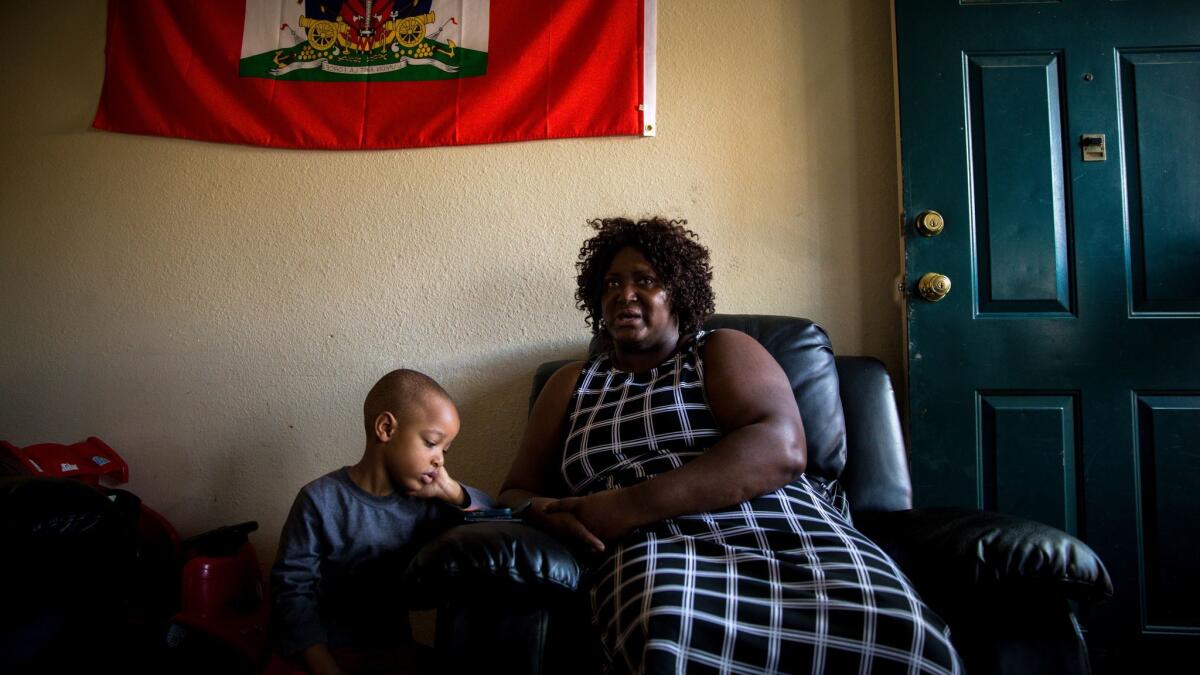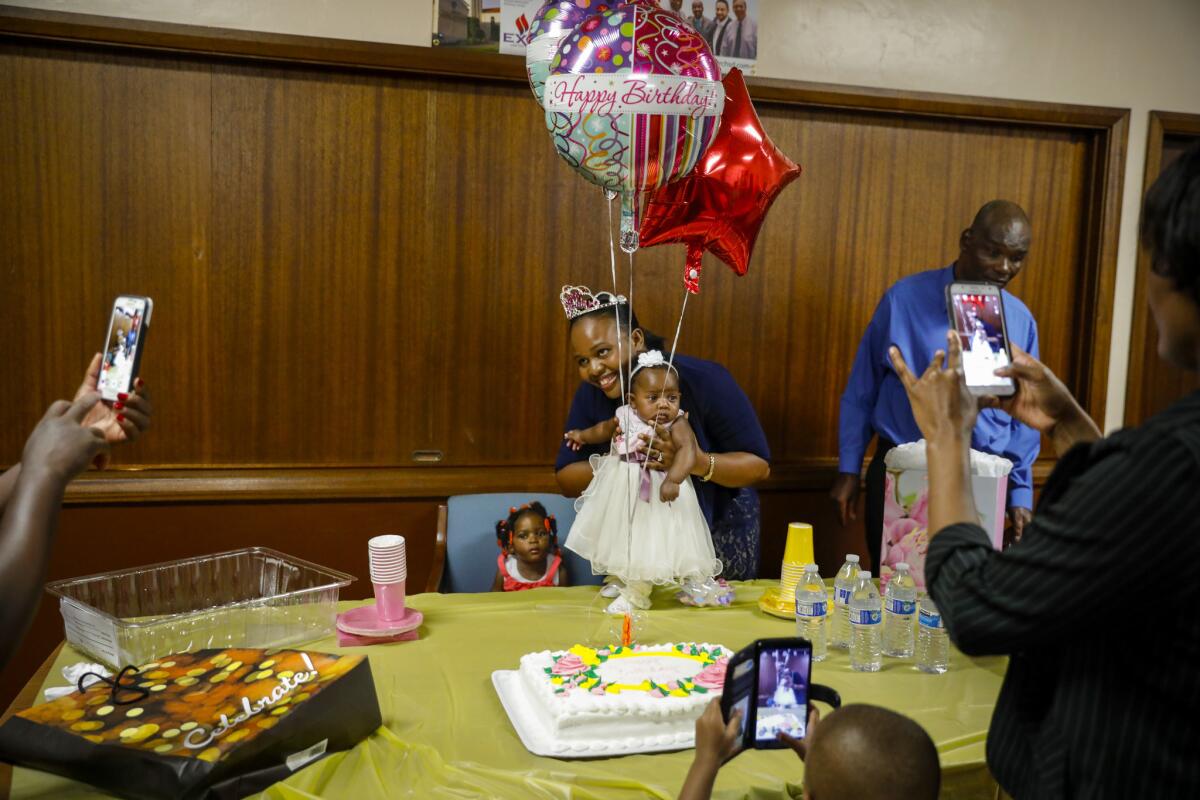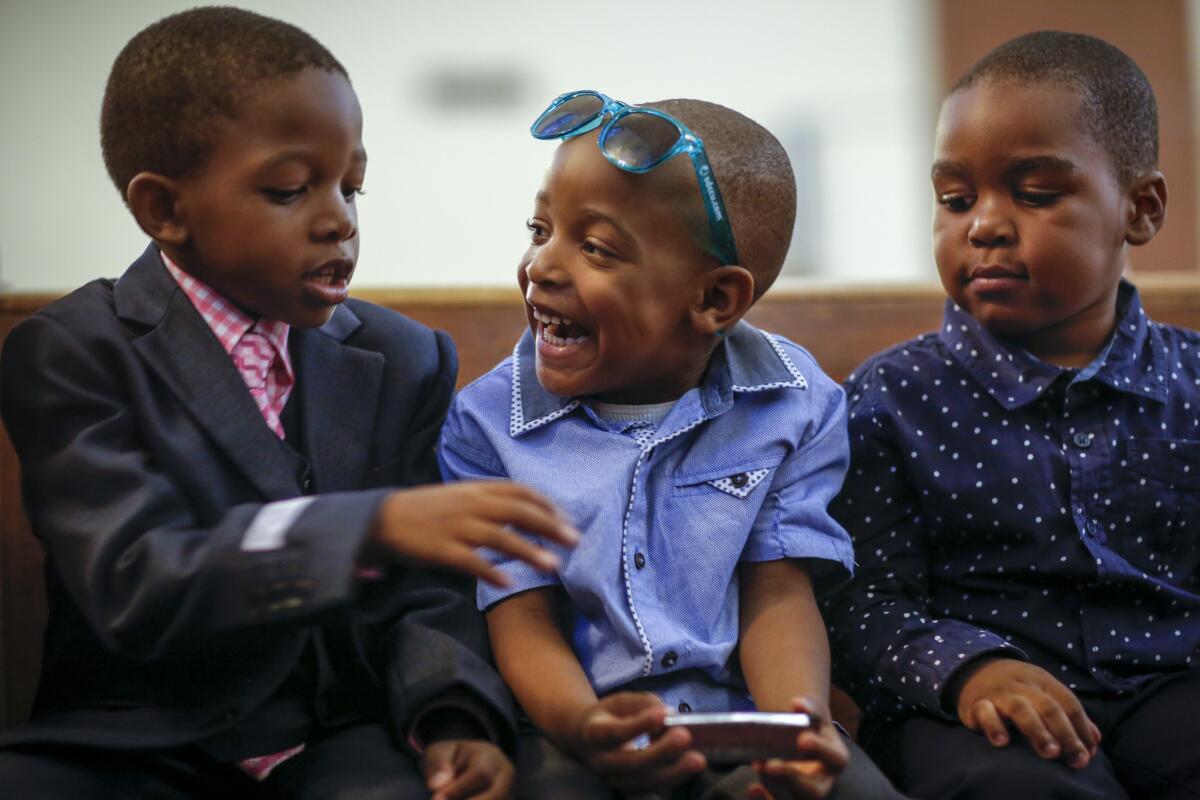In San Diego, Haitians watch community shrink as countrymen leave for Canada

- Share via
Her best friend was one of the first to go. Then the two families she shared a three-bedroom house with headed north. Finally, the nanny.
Over the course of three months, Josiane Valsaint watched fellow Haitians pull roots, pack and make for Canada.
They traveled to Quebec, finding French speakers like themselves and a well-established Haitian community.
“It’s hard for me to see all my friends leave,” Valsaint, 37, said mournfully. “They now have to start over, again.”
Only a blip of time ago, 200 Haitians squeezed into the Haitian Methodist Ministry for evening services. Only 25 showed up earlier this month.
The church was so spare that Nahomie Labady, a Haitian woman who led the congregation in Creole songs of worship, urged people to fill the first four pews. A lighted cross, a 5-foot American flagpole and vases filled with orange, yellow and red silk flowers decorated the drab space.
“M grangou pou prezans ou… ap rele, rele pou glwa ou,” Labady sang in Creole. “I’m hungry for your presence … I cry, I call for your glory.”
Hundreds of Haitians began leaving California, including neighborhoods in places like San Diego, after a
Department of Homeland Security officials have said the program was designed to be temporary in nature, stating that Haiti is showing significant signs of recovery after the 2010 earthquake that drove so many people away. DHS officials say the island nation is ready to repatriate Haitian nationals returning from the U.S.
Jimmy Marcelin, a volunteer for Christ Ministry Center in San Diego, said the community is now on the decline.
The center has helped more than 5,000 Haitians. Most had initially fanned out across the nation while others stayed, said Marcelin, who is a U.S. citizen originally from Haiti.
”Now it’s decimated. Everybody is moving,” he said.
Marcelin, who helps shuttle Haitians to immigration, doctor and other appointments, said he noticed a change about two months ago.
“I would go to pick them up and they were not there,” he said. “Later, they would text me from Canada.”
Valsaint once cared for up to 50 children at the Sunday school. Now there are fewer than a dozen, and most of them just stay at the service. A few play the drums or harmonica. Others clap along to the Christian songs, while some play among the pews.
“Their children played with my children. They were friends,” she said. “They are American citizens.”
In her living room, her two boys — Philippe, 11, and Joshua, 4 — and 20-month-old daughter Sephora played with pull toys and walkers. A Haitian flag was draped over one of the walls of her cramped and cluttered living room.

Valsaint paused and took a deep breath, unsuccessfully trying to fight back tears.
Joshua pulled up a chair next to her, sat down and held her hand.
“This is too much. We are in a bad situation in our country. Why would you kick us out like animals?” she said. “I know nobody is perfect. We Haitian people … we try our best.”
She looked down at Joshua and stroked his face.
“These are my brothers and sisters,” she said of those who have left. “I miss them.”
Valsaint said she briefly considered moving to Canada. But she could not bring herself to do it.
She has a good job as a certified nursing assistant at a local hospital, which allows her to provide for her three children. She makes enough money to send a couple hundred dollars home to her father, who has cancer.
Moving would mean her children would probably no longer see their father, whom she is separated from but who currently lives in San Diego.
“I think of my children,” she said. “They do not want to move to Canada.”

Her youngest, Sephora, an animated toddler who struggles to walk, was born with a hole in her heart and nearly died. Sephora has other health issues that may soon require surgery, Valsaint said. Leaving would put her daughter’s health in jeopardy, she said.
Most days Valsaint gets through her day with a low-simmering anxiety, worried about her family’s fate.
“What happened today, Mommy?” Philippe asks her. “Did someone else leave?”
Valsaint said Philippe, who was born in Haiti, refuses to return there. After the earthquake, he was found under the rubble of his flattened school — seven hours later.
“I’m not going back to Haiti,” he tells his mother.
Vansaint joined hundreds of refugees in May 2010, boarding a smuggler’s boat in Port-au-Prince. She fled political unrest and death threats after she decided to investigate her mother’s homicide during a period of rising impunity in the aftermath of the earthquake, she said.
After a week at sea, she reached Veracruz, Mexico, where she stayed a couple of months before a smuggler guided her across the country to Tijuana. There, she walked up to U.S. immigration officials at a border crossing. Later, she obtained temporary protected status.
Valsaint said life was going well until the Trump administration announced in the spring that it would extend temporary protected status for six months but probably do away with further extensions.
Her best friend, who left July 12, sent Valsaint a text message in Creole before she left.
“I have so much regret and sadness. I’m going to have to leave you, my sister. But I cannot stay here. I have no choice.”
“I will pray for you,” Valsaint texted back.
In late July, the two families who lived with Valsaint — renting two rooms in her three-bedroom home — told her they’d be leaving for Canada in a few weeks. That left Valsaint short on cash for August and unable to send money to her family in Haiti.
Then her longtime babysitter departed without much notice, leaving Valsaint without child care. Valsaint, who works 12 hour days, five days a week, could normally rely on her Haitian friends. But most have left, she said.
All she can do is plead: “Don’t leave. Something good will happen for us.”
On a recent Sunday evening, Valsaint attended a mostly emptied church and listened to Pastor Jean Elise Durandisse speak about keeping faith in God, especially during what he called “troubling days.”
The parishioners stepped away from the pews and joined him in the front of the church. They gathered around him as he spoke into the microphone.
“When life is tough we need faith to make it through. Please, God, help us keep our faith, especially for the many of us still here,” he said. “We don’t want to go to Canada. We have faith. We want to stay here. … Please don't let sadness overcome us. Please give us faith so we can overcome.”
Swaying, with eyes closed, Valsaint nodded and raised her hand.
“Amen,” she said. “Amen.”
Follow Cindy Carcamo on Twitter @thecindycarcamo
Sign up for Essential California
The most important California stories and recommendations in your inbox every morning.
You may occasionally receive promotional content from the Los Angeles Times.








